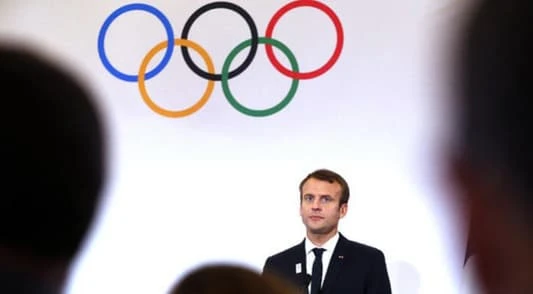Macron says Olympic opening ceremony could move from river to stadium if security threat

Stay tuned with 24 News HD Android App

French President Emmanuel Macron said on Monday for the first time that the Paris Olympics' opening ceremony could move from the river Seine to the national stadium in the event of a security threat.
Macron said instead of teams sailing down the Seine on barges, the ceremony could be "limited to the Trocadero" building across the river from the Eiffel Tower or "even moved to the Stade de France".
The Paris organizers have devised a ceremony that is unprecedented in Olympic history as it breaks from the tradition of the Games opening in the main stadium.
The plans would see as many as 10,000 athletes sailing along a six-kilometre (four-mile) stretch of the Seine in around 160 barges, before gathering at the Trocadero for a ceremony.
But with war raging in Ukraine and in Gaza, the ceremony also leaves teams potentially vulnerable to attack -- French authorities have, for example, mentioned the possibility of an attack launched by drones.
So far, organizers have denied the ceremony on July 26 could be moved to a different venue if authorities believe there is a possibility it will be targeted.
"This opening ceremony... is a world first. We can do it and we are going to do it," Macron said in an interview with BFMTV and RMC.
"We have put in place a security cordon which is going to be very big, where we are going to check all the people coming in and going out," Macron said.
But, he added, "There are Plan Bs and Plan Cs, we are preparing them in parallel... We will analyze this in real-time".
The backup plans include moving the ceremony to the Stade de France to the north of Paris, the main stadium for the Olympics where the rugby sevens and athletics will be held.
Moving the ceremony from the Seine would be a huge undertaking and would deprive the Paris Olympics of its defining image.
If the ceremony is moved to the Stade de France, it would be purely ceremonial without an artistic show, according to sources with knowledge of the arrangements.
More than 300,000 spectators are expected to be present for the ceremony, with another 200,000 watching from buildings along the Seine.
So far, all countries have said they plan to take part in the open-air river parade, including the most risk-averse such as the United States and Israel.
The US Olympic and Paralympic Committee (USOPC) said on Monday it was not surprised that Macron had spoken of contingency plans for the ceremony.
"I think any leader has a plan A, B, and C, at least in the back of their mind," USOPC chief executive Sarah Hirshland told AFP at a US team media event in New York.
"But there's no leader who relies on a single plan at any time. No, I wasn't surprised."
Olympic truce
Macron also said he would do "everything possible" to have an Olympic truce during the Games.
The truce is a historic tradition that peace reigns during the Olympics.
"We want to work towards an Olympic truce and I think I have to engage with a lot of our partners," he said.
He said he would ask the Chinese president to help him with that aim when he visits Paris in early May.
"I have asked Xi Jinping to help me," Macron said.
The Paralympics take place after the Olympics, beginning on August 28.
Macron said he had a target of France finishing in the top five in the medals table for the Olympics and among the top eight nations for the Paralympics.
The president admitted the Paris metro system was not accessible to wheelchair users, which could pose difficulties for spectators at the Paralympics.
Macron admitted that on many of the older metro lines, there was "not enough" accessibility.
He said to compensate, 1,000 taxis with wheelchair access would be made available for the duration of the Paralympics.
